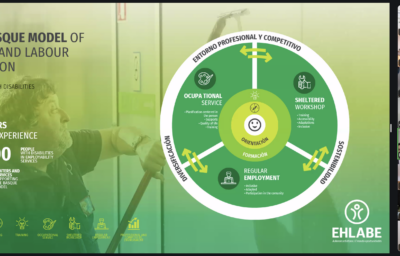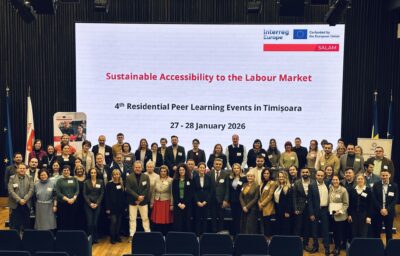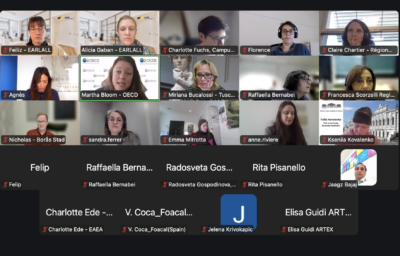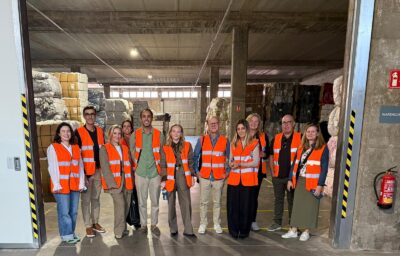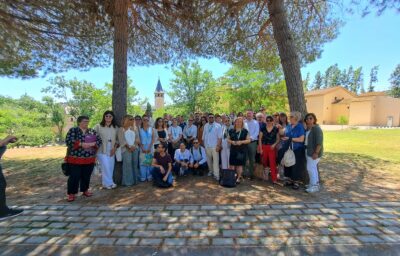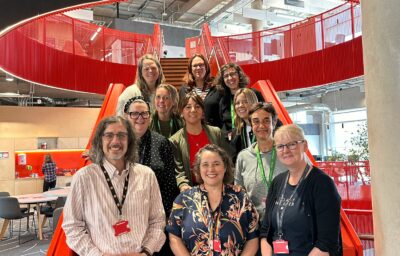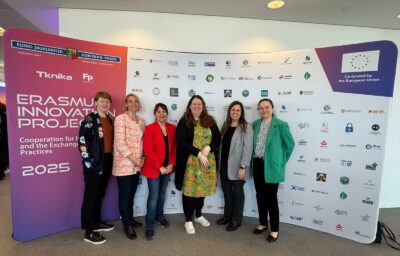Catalonia (Vice-Presidency)
Catalonia’s Regional Ministry of Education and VET is a board member of EARLALL. They are part of the Working Groups on: Mobility, Skills and the Labour Market (which they are leading); Youth Policies and Ageing Populations and Lifelong Guidance.
Catalonia is an autonomous community in Spain, on the north-eastern corner of the Iberian Peninsula, designated as a nationality by its Statute of Autonomy. Catalonia consists of four provinces: Barcelona, Girona, Lleida, and Tarragona. The capital and largest city is Barcelona, the second most-populated municipality in Spain and the core of the sixth most populous urban area in the European Union. It is bordered by France and Andorra to the north, the Mediterranean Sea to the east, and the Spanish autonomous communities of Aragon to the west and Valencia to the south. The official languages are Catalan, Spanish, and Aranese, a dialect of Occitan.
Catalonia has more than 5,000 educational educational institutions throughout its geography with more than 500,000 students in total.
Main economic activities of the region: Agriculture, Livestock, Fishing, Trade, Services, Construction, Industry, Energy, Transport, Tourism, Digital, Design
Catalonia and Lifelong Learning
The General Directorate for Vocational Education and Training of the Regional Ministry of Education and VET of Catalonia is responsible for VET and lifelong learning. The Directorate General for Vocational Education and Training and specifically the Deputy Directorate General for Programmes and Projects work directly with VET schools. The objectives set by the Directorate General for VET are worked together with VET schools through the different programmes: ActivaFp, InnovaFp, EmprènFP, OrientaFP, CatSkills, FuturaFp, Qualitat, FCT-DUAL, MobilitatFP, PFI and IntegraFP.
These programmes work on the implementation of active methodologies, innovation, entrepreneurship, orientation, VET competitions, research and development, quality, DUAL system, students’ and teachers’ mobility, basic professional training and training of the unemployed.
One of the most important goals from The Department of Education and VET in Catalunya is to promote vocational training throughout all the region. Companies have the necessity of hiring more and more qualified employees according to some specific skills only vocational educational training provides. In order to achieve that, promoting international motilities plays a key role due to the benefits the students acquire living abroad for a period of time and attending their internship in a company from abroad.
The DUAL system in vocational training is also highly important. Combining learning and working is highly beneficial for students. Examples of all this benefits are explained below.
For students:
- Students can do practice and theory at the same time.
- Students are trained in a real work environment.
- Feeling valued as a “worker”, as well as being a student.
- Learning acquired in the company is recognized academically.
- Access to technology, resources and facilities of companies.
- Improvement of training, qualification and personal development.
For companies:
- Increase of competitiveness.
- Improvement of professional skills of the staff.
- Contribution to corporate social responsibility policy.
- Establishment of a relation of co-responsibility with vocational training institutions.
The DUAL system is a vocational training model that is organized jointly by companies and educational centers (through a collaboration agreement). In companies students learn to work and receive an economic remuneration. Internships may be carried out in two different ways: contract or scholarship. Students in the company are tutored by qualified professionals who have received the basic training that enables them to follow and evaluate the educational activities. Nowadays more than 10,000 students have opted for the modality of the DUAL VET and more than 4,000 companies collaborate in this training model. Among the most involved business sectors in the development of DUAL system we find industry and service providers.
The implementation of more and more international mobilities in all vocational training institutions is also relevant, as more than 2,000 international mobilities are carried out by vocational training institutions in Catalunya with good benefits for all the communities involved: institutions, students and companies. Students attend their mobilities throughout all Europe mainly in France, Italy and Germany. Vocational training institutions also receive students from abroad in order to carry out their internship in Catalunya, promoting cultural exchange between students.
Vocational education and training degrees adapted to some specific companies are under implementation in order to create specific skills according to the needs of all those companies. It is beneficial not only for some specific sectors but also for the employment rates of the region.
Direct access from vocational training degree to university has also been implemented in order to facilitate university access to students. Some other implementations are access to vocational training degrees at any time and under any circumstances, as well as recognition of professional qualifications acquired through work experience.
Catalonia’s priorities in lifelong learning
Catalonia’s priorities:
- to increase the number of students in the DUAL system
- to reach 5% of Catalan VET students participating in an international mobility by 2030
- to certify quality, safety, sustainability and the areas to increase in management following the e2cat model
- to promote innovation and entrepreneurship projects aimed at improving the skills of VET students.
Examples of Projects in the region
3LoE: Three-level centres of professional excellence: Qualification, entrepreneurship and innovation in the Green Economy, 2020-2024
The main objectives of 3LoE are:
- Sustainably upgrade skills, secure the need for young professionals/managers and entrepreneurs, and strengthen the competitiveness of SMEs in the green economy
- Realise energy savings, use renewable energies and environmental and climate protection through qualified and innovative SMEs
The project targeted VET providers, companies, industry representatives, public authorities, universities, research centres, non-governmental organisations and associations The main outcome is the creation of Centres of Vocational Excellence (CoVEs) on green economy. Find out more at https://3-loe.eu.
SHOW-VET, 2022-2024
The core idea of the SHOW-VET project is that the consortium of education providers and other partners will develop a teacher’s guide including pedagogical methods, teachers’ training material, providing training for mentors and teachers from selected study fields and develop new e-learning material. The project targets VET providers, educational organisations, professional associations, universities and VET teachers and students. For more information: https://showvetproject.eu/en
Useful links
Related documents
-
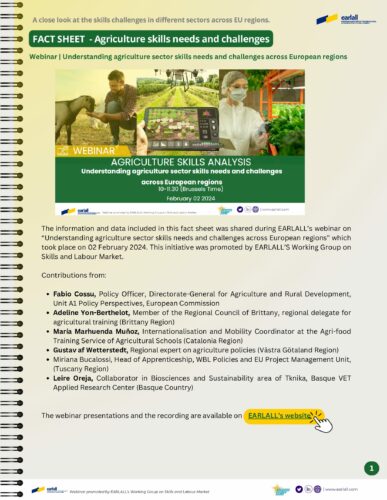
Report
Fact Sheet: Skills needs and challenges in the agriculture sector
Download -
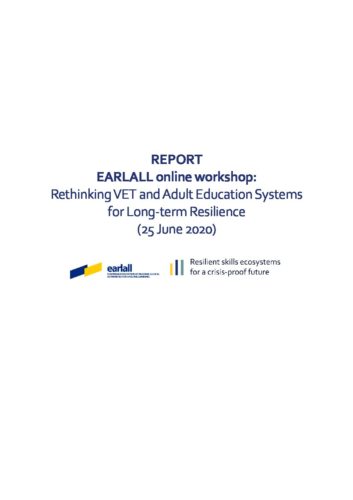
Report
Workshop report – VET & AE post-covid19
Download -
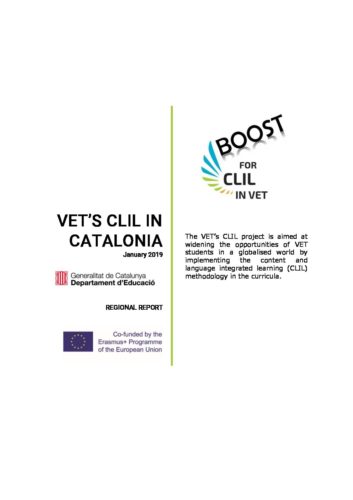
Report
VET’s CLIL in Catalonia
DownloadRegional report about VET’s CLIL in Catalonia, produced in the context of the BOOST to it! VET’s CLIL Erasmus+ KA2 project, coordinated by POV (Flanders, Belgium).
-
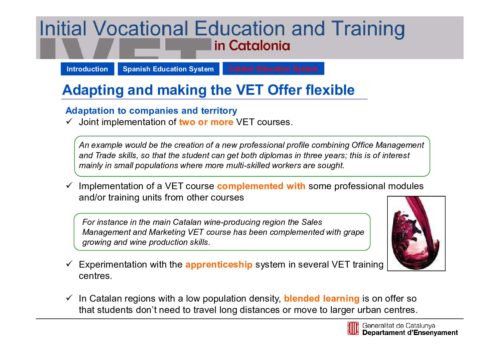
Report
VET Mobility – Catalonia (part 2)
Download -
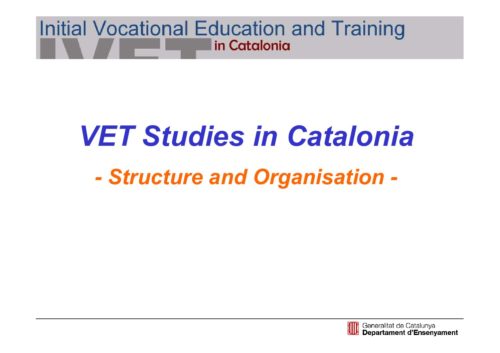
Report
VET Mobility – Catalonia (part 1)
Download -
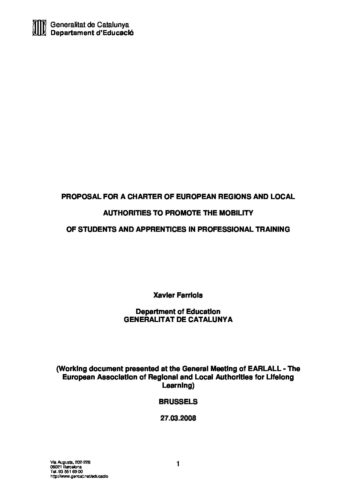
Report
Catalonia – European charter for mobility in apprenticeships (EN)
Download -
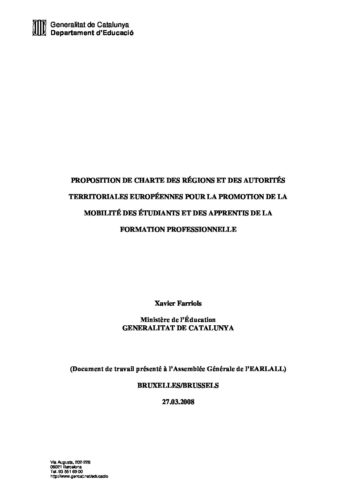
Report
Catalonia – European charter for mobility in apprenticeships (FR)
Download -
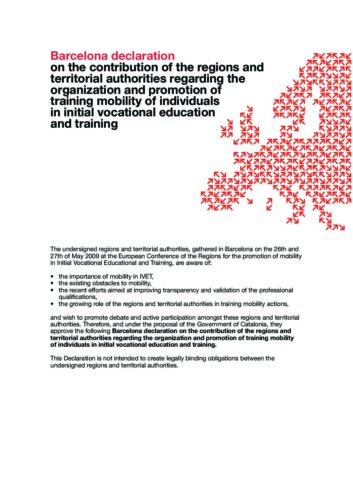
Report
Barcelona declaration – Mobility in VET
Download



